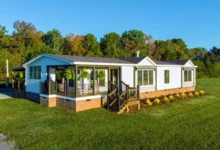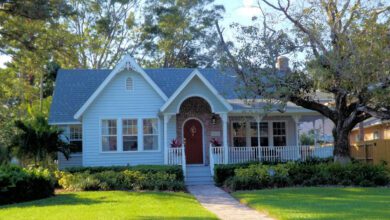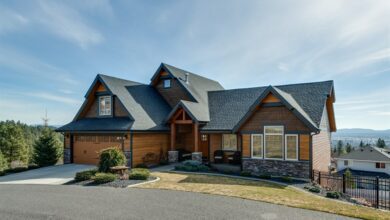Mobile Home and Land for Sale: Finding Your Perfect Property
Mobile Home and Land for Sale – Are you in search of a mobile home and land for sale? Look no further, as this comprehensive guide will provide you with all the information you need to find your perfect property. Mobile homes offer an affordable and convenient housing option, and having your own land provides the freedom and flexibility that many desire. Whether you are a first-time buyer or looking to upgrade, this article will walk you through the process, offering valuable insights and tips along the way.
In this guide, we will explore various aspects of buying a mobile home and land for sale. From understanding the benefits of mobile homes to knowing what to look for in the perfect location, we’ve got you covered. We’ll also delve into financing options and the steps involved in the purchasing process. By the end of this article, you’ll be equipped with the knowledge and confidence to make an informed decision and find the mobile home and land that fits your needs and budget.
The Advantages of Mobile Homes
Mobile homes offer numerous advantages that make them an attractive housing choice for many individuals and families. Firstly, affordability is a key factor. Mobile homes typically cost significantly less than traditional houses, allowing you to own a property without breaking the bank. Additionally, mobile homes often come with lower maintenance and utility costs, saving you money in the long run.
Another advantage of mobile homes is their flexibility. Unlike traditional homes, mobile homes can be easily relocated if needed. This provides the freedom to move to a different location without the hassle of selling or buying a new property. Whether you want to explore different neighborhoods, change cities, or embrace a nomadic lifestyle, a mobile home allows for unparalleled flexibility.
Furthermore, mobile homes offer customization options. Many manufacturers provide a range of floor plans and designs to choose from, allowing you to personalize your home according to your preferences and needs. From the number of bedrooms to the layout of the kitchen, you can create a space that suits your lifestyle perfectly.
Affordability
One of the greatest advantages of mobile homes is their affordability. Compared to traditional houses, mobile homes are significantly cheaper, making homeownership more accessible for individuals and families on a budget. The lower cost of mobile homes is due to various factors, including the materials used, the construction process, and the ability to mass-produce these homes.
When comparing the cost of a mobile home and land to a traditional house, it’s important to consider not just the initial purchase price but also the long-term expenses. Mobile homes typically have lower property taxes, insurance premiums, and maintenance costs. Additionally, energy-efficient features and newer models can contribute to lower utility bills, further reducing the overall cost of living in a mobile home.
Flexibility and Mobility
One of the unique advantages of mobile homes is their mobility. Unlike traditional houses, mobile homes are built on a chassis and can be transported to different locations. This flexibility allows homeowners to easily move their homes to new areas, whether it’s due to job relocations, desire for a change of scenery, or other personal reasons.
Imagine having the freedom to explore different neighborhoods, cities, or even states without the hassle of selling your home and buying a new one. Mobile homes offer this level of flexibility, making them an ideal choice for those seeking adventure or a change of environment. Whether you want to experience different communities, climates, or natural landscapes, a mobile home allows you to do so with ease.
Moreover, mobile homes are perfect for those who enjoy a nomadic lifestyle. If you have a wanderlust spirit and love to travel, a mobile home can serve as your home-on-wheels. You can take your mobile home to various destinations, exploring new places and creating unforgettable memories along the way. This level of mobility is unmatched by traditional homes, providing a unique and exciting living experience.
Customization Options
When it comes to mobile homes, customization options are plentiful. Manufacturers offer a wide range of floor plans, designs, and features that allow you to create a home that reflects your personal taste and meets your specific needs. Whether you prefer a cozy one-bedroom layout or a spacious multi-bedroom design, there is a mobile home floor plan for every lifestyle.
In addition to floor plans, you can also choose from various exterior and interior finishes, colors, materials, and appliances. This level of customization allows you to personalize your mobile home and make it feel like a true reflection of your style and personality. From selecting the type of flooring to deciding on the kitchen countertops, you have the opportunity to create a space that is uniquely yours.
Furthermore, customization options extend beyond the initial purchase. Once you have your mobile home, you can continue to personalize and modify it according to your preferences. Whether you want to renovate the bathroom, upgrade the appliances, or change the interior decor, mobile homes offer the flexibility to transform your living space and make it truly one-of-a-kind.
Finding the Perfect Land
Location plays a crucial role when it comes to mobile homes. Finding the perfect plot of land is essential to ensure that your mobile home is situated in an area that meets your lifestyle needs and preferences. From considering proximity to amenities to evaluating the neighborhood, there are several factors to keep in mind when searching for the ideal land for your mobile home.
Proximity to Amenities
When choosing the location for your mobile home, it’s important to consider the proximity to amenities that are important to you. Think about the amenities you value most, such as schools, medical facilities, shopping centers, recreational areas, and public transportation. Determine how close you want these amenities to be and prioritize them when searching for land.
For example, if you have children, you may want to ensure that there are good schools nearby. Similarly, if you rely on public transportation or prefer to have easy access to shopping and entertainment options, you may want to prioritize finding land that is conveniently located to these amenities. Assess your lifestyle needs and preferences to identify the amenities that are essential for you and focus your search accordingly.
Neighborhood Evaluation
The neighborhood in which your mobile home is located can greatly impact your overall living experience. It’s important to evaluate the neighborhood before making a decision. Consider factors such as safety, community atmosphere, and the overall quality of life in the area.
Research crime rates, speak with current residents, and visit the neighborhood at different times of day to get a feel for the atmosphere. Look for signs of a well-maintained neighborhood, such as clean streets, well-kept yards, and a sense of community pride. Pay attention to the amenities available within the neighborhood itself, such as parks, community centers, and recreational facilities, as these can greatly enhance your living experience.
Additionally, consider the future development plans for the area. Are there any upcoming projects or changes that may affect the value of your property or the quality of life in the neighborhood? It’s important to be aware of any potential developments that may impact your decision to purchase land in a specific location.
Land Suitability
When evaluating potential land for your mobile home, it’s important to assess its suitability for your specific needs. Consider factors such as the size and shape of the land, the presence of any natural features, and the overall terrain.
Start by determining the size of the land you require to accommodate your mobile home comfortably. Consider any additional outdoor space you desire, such as a backyard or garden area. Ensure that the land you are considering meets these size requirements.
Next, assess the shape of the land. A rectangular or square-shaped plot may be more suitable for a mobile home, as it will allow for easier placement and better utilization of the space. Irregularly shaped land may present challenges in terms of positioning and landscaping.
Take note of any natural features on the land, such as trees, bodies of water, or slopes. These features can add to the charm of your property but may also require special considerations. For example, if there are large trees on the land, you may need to factor in the cost of tree maintenance or removal. Similarly, if there are slopes, you may need to consider how this will impact the placement and stability of your mobile home.
Financing Your Dream: Exploring Loan Options
Once you have identified the mobile home and land you wish to purchase, it’s time to explore financing options. There are several loan programs and grants available to help you achieve your dream of homeownership. Understanding these options and choosing the right financing solution is crucial to ensure a smooth and affordable purchasing process.
Government Programs
Government programs can be a valuable resource when it comes to financing your mobile home and land purchase. The Federal Housing Administration (FHA) offers loans specifically designed for mobile homes, known as FHA Title I loans. These loans provide competitive interest rates and flexible terms, making them an attractive option for many buyers.
In addition to FHA loans, the United States Department of Agriculture (USDA) provides loans and grants to assist low- and moderate-income families in rural areas. The USDA’s Rural Development program offers financing options for the purchase of mobile homes and land, with favorable terms and low down payment requirements.
Furthermore, some states and local governments offer homebuyer assistance programs that provide down payment assistance, closing cost assistance, and other financial incentives. Research the programs available in your area to determine if you qualify for any of these benefits.
Loans from Financial Institutions
In addition to government programs, you can also explore loan options from financial institutions such as banks, credit unions, and mortgage lenders. These institutions offer a variety of loan products that can be used to finance the purchase of a mobile home and land.
Traditional mortgage loans can be an option if you are purchasing land along with the mobile home. With a mortgage loan, the land and mobile home are considered one property, and you make monthly mortgage payments based on the total value of the property. This type of loan typically requires a higher down payment and may have stricter eligibility criteria.
Another option is a chattel loan, which is specifically designed for mobile homes that are not permanently affixed to a foundation or land. Chattel loans are similar to personal loans and are secured by the mobile home itself. These loans often have higher interest rates compared to traditional mortgage loans but may have more flexible eligibility requirements.
It is important to shop around and compare loan offers from different financial institutions to find the best terms and rates that suit your financial situation. Consider factors such as interest rates, repayment terms, down payment requirements, and any additional fees or charges associated with the loan. Getting pre-approved for a loan can also give you a better idea of your budget and streamline the purchasing process.
Grants and Down Payment Assistance
In addition to loan options, there are grants and down payment assistance programs available that can help reduce the financial burden of purchasing a mobile home and land. These programs are typically offered by government agencies, non-profit organizations, or community development organizations.
Grants are funds that do not need to be repaid and are often provided to individuals or families with low to moderate incomes. These grants can be used towards the down payment, closing costs, or even as a subsidy towards the purchase price of the mobile home and land. Research local grant programs in your area and see if you meet the eligibility criteria.
Down payment assistance programs are designed to help individuals and families who may not have enough savings for a large down payment. These programs provide financial assistance that can be used towards the down payment, allowing you to secure a loan with a lower down payment requirement. Similar to grants, down payment assistance programs have specific eligibility criteria that you must meet.
To access these grants and down payment assistance programs, you will typically need to complete an application process and provide documentation to prove your eligibility. It is important to start the application process early and gather all the necessary documents to ensure a smooth and timely approval.
The Purchasing Process: A Step-by-Step Guide
Once you have secured financing and identified the mobile home and land you wish to purchase, it’s time to navigate the purchasing process. This step-by-step guide will walk you through the necessary steps to ensure a smooth and successful transaction.
Step 1: Research and Budget
Before diving into the purchasing process, it is essential to conduct thorough research and establish a budget. Research different mobile home models, manufacturers, and land options to get a sense of what is available in the market. Consider your needs, preferences, and financial situation to determine the type of mobile home and land that best suits you.
Establishing a budget is crucial to ensure that you stay within your financial means. Consider not only the purchase price but also ongoing expenses such as property taxes, insurance, maintenance, and utility costs. It is recommended to consult with a financial advisor or mortgage lender to determine a realistic budget and get pre-approved for a loan if necessary.
Step 2: Find a Real Estate Agent or Broker
Working with a reputable real estate agent or broker who specializes in mobile homes can greatly simplify the purchasing process. They have the knowledge, experience, and connections to help you find suitable properties, negotiate the best price, and guide you through the paperwork.
When choosing a real estate agent or broker, make sure they have experience in mobile home sales and a good understanding of the local market. Ask for recommendations, read reviews, and interview multiple agents before making a decision. A good agent will not only help you find properties but also provide valuable advice and support throughout the entire process.
Step 3: Search for Listings
Once you have a real estate agent or broker onboard, start searching for mobile home and land listings. Online platforms, real estate websites, and local classifieds can be great resources for finding available properties. Provide your agent with your specific criteria, such as location, size, budget, and any other preferences, to narrow down the search.
Take the time to visit potential properties in person to get a feel for the neighborhood, assess the condition of the mobile home, and evaluate the land. Pay attention to details such as the overall appearance, structural integrity, plumbing, electrical systems, and any potential repairs or renovations that may be needed.
Step 4: Negotiate the Price
Once you have identified a property that meets your criteria, it’s time to negotiate the price. Work closely with your real estate agent to determine a fair offer based on market value, the condition of the property, and any additional factors that may affect the price.
Be prepared for counteroffers and negotiations. Keep in mind that the final price should align with your budget and the value of the mobile home and land. Your agent will help you navigate the negotiation process and ensure your interests are represented.
Step 5: Inspections and Due Diligence
Before finalizing the purchase, it is crucial to conduct inspections and due diligence to ensure that the property meets your expectations and is in good condition. Hire a professional inspector to assess the mobile home’s structure, plumbing, electrical systems, and overall safety.
Additionally, conduct a thorough title search to ensure there are no liens, encumbrances, or legal issues associated with the property. Your real estate agent or broker can assist you with these inspections and due diligence processes, ensuring that you have all the necessary information to make an informed decision.
Step 6: Financing and Closing
Once you are satisfied with the inspections and due diligence, it’s time to finalize the financing and move towards closing the deal. Provide all the necessary documents and information to your lender to complete the loan process. Ensure that you understand all the terms and conditions of the loan and review the closing costs and fees.
Before closing, conduct a final walkthrough of the property to ensure that any agreed-upon repairs or changes have been completed satisfactorily. On the closing day, review and sign all the necessary documents, including the loan agreement, title transfer, and any other legal paperwork. Make sure to have a clear understanding of your rights and responsibilities as a homeowner.
Step 7: Move-in and Settling In
Congratulations! You are now the proud owner of a mobile home and land. Coordinate with movers or transport services to relocate your mobile home to the purchased land if necessary. Settle into your new home, connect utilities, and make any necessary adjustments or renovations to make it feel like your own.
Take the time to explore your new neighborhood, meet your neighbors, and familiarize yourself with local amenities and services. Register your mobile home with the appropriate authorities, update your address with relevant institutions, and enjoy the experience of settling into your new home.
Evaluating Mobile Home Conditions
When purchasing a mobile home, it is essential to evaluate the condition of the property thoroughly. Understanding the condition of the mobile home will help you make an informed decision and avoid any unexpected repairs or costs down the line. Here are some key factors to consider when evaluating the condition of a mobile home.
Structural Integrity
The structural integrity of a mobile home is paramount to its safety and longevity. Inspect the foundation, walls, roof, and overall structure of the mobile home. Look for any signs of damage, such as cracks, leaks, or sagging. Pay attention to the quality of the construction materials and the general workmanship of the home.
If possible, hire a professional inspector who specializes in mobile homes to assess the structural integrity. They can identify any hidden issues, such as water damage, rot, or pest infestations, that may not be immediately visible to the untrained eye.
Plumbing and Electrical Systems
The plumbing and electrical systems of a mobile home are crucial for its functionality and comfort. Test the water supply by running faucets, flushing toilets, and checking for any leaks or irregularities. Inspect the hot water heater, pipes, and fixtures for signs of wear or damage.
Similarly, evaluate the electrical system by testing outlets, switches, and lighting fixtures. Ensure that the electrical panel is in good condition and up to code. Faulty wiring or outdated electrical systems can pose safety hazards and may require costly repairs or upgrades.
Heating and Cooling
Evaluate the heating and cooling systems in the mobile home to ensure they are in proper working order. Test the furnace, air conditioning unit, and any other heating or cooling appliances. Inquire about the age and maintenance history of these systems, as older units may require more frequent repairs or replacement.
Efficient heating and cooling systems are essential for maintaining a comfortable living environment and managing energy costs. Consider the energy efficiency of the mobile home and look for features such as insulation, double-pane windows, and energy-saving appliances that can contribute to lower utility bills.
Interior and Exterior Condition
Inspect the interior and exterior of the mobile home for any signs of damage, wear, or neglect. Check the flooring, walls, ceilings, and fixtures for any needed repairs or maintenance. Evaluate the condition of the exterior siding, roof, windows, and doors.
Look for any signs of mold, mildew, or water damage, as these issues can indicate underlying problems that may require professional attention. Take note of any necessary repairs or cosmetic upgrades that may be needed to bring the mobile home up to your desired standards.
Appliances and Fixtures
Evaluate the condition and functionality of the appliances and fixtures in the mobile home. Test the stove, oven, refrigerator, dishwasher, and any other appliances included in the sale. Check for signs of wear, damage, or malfunctioning.
Inspect the plumbing fixtures such as sinks, faucets, showers, and toilets. Ensure that they are in proper working order and that there are no leaks or water pressure issues. Consider the age and maintenance history of the appliances and fixtures, as older units may require more frequent repairs or replacement.
Overall Maintenance and Care
Assess the overall maintenance and care that has been given to the mobile home. Look for signs of regular upkeep, such as well-maintained landscaping, clean gutters, and a well-preserved exterior. A mobile home that has been well cared for is likely to have fewer issues and require less immediate attention.
However, keep in mind that even a well-maintained mobile home may still have underlying issues. It is important to conduct a thorough inspection and consider getting professional opinions to ensure that you are fully aware of the condition of the property before making a purchase.
Professional Inspections
Consider hiring a professional inspector who specializes in mobile homes to conduct a comprehensive inspection of the property. These inspectors have the expertise and knowledge to identify potential issues that may not be immediately apparent to a regular buyer.
A professional inspection can provide you with a detailed report on the condition of the mobile home, including any required repairs or maintenance. This information can help you negotiate the price or make an informed decision about whether to proceed with the purchase.
Remember that a thorough evaluation of the mobile home’s condition is crucial to avoid any unexpected expenses or safety hazards. Taking the time to assess the structural integrity, plumbing and electrical systems, heating and cooling, interior and exterior condition, and overall maintenance will ensure that you are making a sound investment and choosing a mobile home that meets your needs and expectations.
Customizing Your Mobile Home
One of the advantages of owning a mobile home is the ability to customize it to your liking. Whether you want to add personal touches or undertake more extensive remodeling, there are numerous options available to make your mobile home feel like a true reflection of your style and preferences.
Interior Design and Decor
One of the easiest and most effective ways to customize your mobile home is through interior design and decor. Consider the overall style and theme you want to achieve and select furniture, accessories, and color schemes that align with your vision.
Start by choosing a color palette that complements your taste and creates the desired atmosphere in each room. Paint the walls, or use wallpaper or wall decals to add texture and visual interest. Select furniture pieces that are both functional and aesthetically pleasing, ensuring they fit well within the space.
Accessorize with curtains, rugs, throw pillows, and artwork that reflect your personal style. These small details can greatly enhance the overall ambiance and make your mobile home feel more inviting and personalized.
Kitchen and Bathroom Upgrades
The kitchen and bathroom are often considered the heart of a home. Upgrading these areas can significantly enhance both the functionality and aesthetics of your mobile home.
In the kitchen, consider replacing outdated appliances with more modern and energy-efficient models. Upgrade countertops, cabinets, and backsplash to create a fresh and stylish look. Add additional storage solutions, such as shelving or a kitchen island, to maximize space and functionality.
In the bathroom, replace fixtures such as faucets, showerheads, and toilets to improve water efficiency and aesthetics. Consider adding storage options, such as a vanity or shelving, to keep the space organized and clutter-free. Upgrade the lighting to create a bright and inviting atmosphere.
Flooring and Lighting
Flooring and lighting can have a significant impact on the overall look and feel of your mobile home. Consider upgrading or replacing flooring materials to match your preferred style. Choose from options such as hardwood, laminate, vinyl, or carpeting, depending on your preferences and budget.
Lighting is another important aspect of customization. Upgrade light fixtures to enhance the ambiance and functionality of each room. Consider adding dimmer switches or installing additional lighting fixtures to create different moods and accommodate various activities.
Exterior Enhancements
Don’t forget about the exterior of your mobile home when customizing. Enhancing the curb appeal can make a significant difference in the overall appearance and value of your property.
Consider painting the exterior walls or adding siding for a fresh and updated look. Install outdoor lighting to highlight architectural features and create a welcoming atmosphere. Add landscaping elements such as flower beds, bushes, or trees to enhance the natural beauty of the surroundings.
Energy Efficiency Upgrades
In addition to aesthetics, consider making energy-efficient upgrades to your mobile home. These upgrades can help reduce energy consumption, lower utility bills, and minimize your environmental impact.
Install energy-efficient windows and doors to improve insulation and reduce heat loss or gain. Upgrade to energy-efficient appliances, such as refrigerators, washing machines, and air conditioning units. Consider adding insulation to the walls, roof, or floor to improve energy efficiency and comfort.
Making energy-efficient upgrades not only benefits your wallet but also contributes to a more sustainable and eco-friendly lifestyle.
Ensuring a Smooth Move
Moving into your mobile home is an exciting time, but it can also be a stressful process. Proper planning and organization can help ensure a smooth and seamless move.
Create a Moving Checklist
Start by creating a comprehensive moving checklist. This will help you stay organized and ensure that you don’t forget any essential tasks or items. Include everything from packing and labeling boxes to notifying utility companies of your move.
Break down the moving process into smaller, manageable tasks and set realistic deadlines for each. This will help you stay on track and reduce last-minute stress.
Pack Efficiently
When packing your belongings, it’s important to do so efficiently to make the unpacking process easier. Start by decluttering and getting rid of any items you no longer need or want. This will help reduce the number of items you need to pack and transport.
Pack items room by room and label each box with its contents and the intended room. This will make it easier to locate specific items when unpacking. Consider using color-coded labels or a numbering system to further streamline the process.
Don’t forget to pack a separate essentials box with items you will need immediately upon arrival, such as toiletries, a change of clothes, bedding, and basic kitchen supplies. Keep this box easily accessible during the move.
Hire Professional Movers
Consider hiring professional movers to assist with the physical aspect of the move. They have the expertise and equipment to safely and efficiently transport your belongings from your current location to your new mobile home.
Research and compare different moving companies to find one that suits your needs and budget. Read reviews, ask for recommendations, and ensure that the company is licensed and insured. Obtain quotes and confirm the availability of your preferred moving date well in advance.
Update Your Address and Utilities
Before moving into your new mobile home, it’s important to update your address and notify relevant institutions and service providers of your new location. This includes updating your address with the post office, banks, insurance companies, and any subscriptions or memberships you have.
Contact utility companies, including electricity, water, gas, internet, and cable providers, to set up new accounts or transfer existing ones to your new address. Schedule the disconnection of services at your old location and ensure that utilities are connected and functioning properly at your new mobile home.
Unpack and Settle In
Once you have arrived at your new mobile home, start by unpacking essential items and setting up the basic necessities. Focus on getting the kitchen, bathroom, and bedroom set up first to ensure your immediate comfort.
Take your time unpacking and organizing your belongings. Consider the layout and storage options in your new mobile home and make adjustments as needed. This is an opportunity to create a fresh and organized living space that suits your needs and preferences.
Take breaks, stay hydrated, and reach out to friends or family for assistance if needed. Moving can be physically and emotionally demanding, so it’s important to prioritize self-care throughout the process.
Maintaining Your Mobile Home and Land
Regular maintenance is key to preserving the value and longevity of your mobile home and land. By implementing a routine maintenance schedule and addressing any issues promptly, you can ensure that your property remains in optimal condition.
Landscaping and Outdoor Maintenance
Maintaining the landscaping and outdoor areas of your mobile home can greatly enhance its curb appeal and overall enjoyment. Regularly mow the lawn, trim bushes and trees, and remove any weeds or debris. Consider adding flower beds or potted plants to add color and vibrancy to your outdoor space.
Inspect and clean gutters to prevent clogs and water damage. Regularly check for any signs of damage or wear on the exterior of your mobile home, such as cracks, peeling paint, or loose siding. Address these issues promptly to prevent further damage or deterioration.
Plumbing and Electrical Checks
Regularly inspecting the plumbing and electrical systems in your mobile home is essential to ensure their proper functioning and to identify any potential issues. Check for leaks, drips, or water pressure irregularities in faucets, showers, and toilets. Inspect exposed pipes for signs of corrosion or damage.
Test electrical outlets, switches, and light fixtures to ensure they are working correctly. Replace any burnt-out bulbs and address any flickering or dimming lights. Consider hiring a professional to conduct a more thorough inspection of the electrical system every few years.
Heating and Cooling Maintenance
Proper maintenance of the heating and cooling systems in yourmobile home is crucial for their efficiency and longevity. Regularly clean or replace HVAC filters to ensure proper airflow and prevent dust buildup. Schedule annual maintenance appointments with a professional to inspect and tune up your heating and cooling systems.
Additionally, consider implementing energy-saving practices to reduce your energy consumption and lower utility costs. Set programmable thermostats to optimize temperature settings and minimize energy usage when you are away from home. Use natural ventilation and shading techniques to reduce the need for excessive air conditioning during the warmer months.
Roof and Exterior Maintenance
Regularly inspect the roof of your mobile home for any signs of damage, such as missing or damaged shingles, leaks, or sagging. Address these issues promptly to prevent water damage and further deterioration. Consider scheduling professional roof inspections every few years to ensure the integrity of your roof.
Inspect the exterior of your mobile home for any cracks, gaps, or loose siding. Repair or replace these areas to maintain the structural integrity and weatherproofing of your home. Clean exterior surfaces regularly to prevent dirt, mold, or mildew buildup.
Regular Cleaning and Pest Control
Regular cleaning is essential to maintain a clean and healthy living environment in your mobile home. Dust and vacuum regularly to minimize allergens and maintain air quality. Clean countertops, sinks, and appliances to prevent the buildup of dirt and bacteria.
Implement pest control measures to prevent infestations and protect your mobile home. Seal any gaps or cracks that may serve as entry points for pests. Keep food storage areas clean and properly sealed to discourage pests from entering your home.
Regular Inspections and Repairs
Schedule regular inspections of your mobile home to identify any potential issues before they become major problems. This includes inspecting windows and doors for proper sealing and insulation, checking for signs of water leaks or damage, and assessing the condition of flooring, walls, and ceilings.
Address any necessary repairs promptly to prevent further damage and costly repairs down the line. This may include fixing plumbing issues, repairing cracks or damage to walls or ceilings, or replacing worn-out flooring materials.
Energy Efficiency Upgrades
Consider implementing energy-efficient upgrades to your mobile home to reduce your environmental impact and lower your utility bills. Replace old appliances with energy-efficient models that carry the ENERGY STAR label. Upgrade insulation in walls, floors, and roofs to improve energy efficiency and maintain a comfortable indoor temperature.
Install weatherstripping or caulking around windows and doors to prevent drafts and improve energy efficiency. Consider adding solar panels to your mobile home to generate renewable energy and reduce your reliance on traditional power sources.
Joining a Mobile Home Community
Joining a mobile home community can provide a sense of belonging and a supportive network of neighbors. These communities offer a range of benefits and amenities that can enhance your mobile home living experience.
Shared Amenities
Mobile home communities often offer shared amenities that are accessible to all residents. These amenities may include community centers, swimming pools, fitness facilities, playgrounds, or picnic areas. Access to these shared spaces can provide opportunities for socializing, recreation, and relaxation.
Shared amenities can also contribute to a sense of community and foster a supportive environment among residents. They provide opportunities to meet and connect with neighbors, participate in community events, and build lasting friendships.
Community Events and Activities
Mobile home communities often organize community events and activities for residents. These can include holiday celebrations, potluck dinners, game nights, or gardening clubs. Participating in these events provides opportunities to socialize, get to know your neighbors, and actively engage in the community.
Additionally, many mobile home communities have organized activities and clubs catering to various interests and hobbies. These can include book clubs, fitness classes, arts and crafts groups, or sports leagues. Participating in these activities allows you to pursue your interests and passions while connecting with like-minded individuals.
Sense of Security and Support
Living in a mobile home community can provide a sense of security and support. Neighbors often watch out for one another, creating a close-knit community where residents look out for each other’s well-being.
Mobile home communities may also have security measures in place, such as gated entrances, security patrols, or surveillance systems. These measures can contribute to a sense of safety and peace of mind for residents.
In addition to the sense of security, living in a mobile home community can provide a support system. Whether it’s lending a helping hand during a move, sharing resources or advice, or providing emotional support during challenging times, the community network can be a valuable asset.
Community Guidelines and Regulations
It’s important to familiarize yourself with the community guidelines and regulations when joining a mobile home community. These guidelines are designed to maintain a harmonious living environment and protect the interests of all residents.
Review the community’s rules and regulations regarding pet ownership, noise levels, architectural guidelines, and any other relevant policies. Understanding and abiding by these guidelines will contribute to a positive living experience for everyone in the community.
Resale Value and Future Opportunities
Owning a mobile home and land can offer not only a comfortable living environment but also potential financial benefits and future opportunities.
Resale Value
Mobile homes can have good resale value, especially if they are well-maintained and located in desirable areas. The demand for affordable housing options continues to grow, making mobile homes an attractive choice for many buyers.
To maximize resale value, it’s important to keep your mobile home and land in good condition, make any necessary repairs or upgrades, and stay updated on current market trends. Additionally, factors such as location, amenities, and the overall condition of the community can also impact resale value.
Future Opportunities
Owning a mobile home and land opens up future opportunities for homeownership and investment. If you decide to upgrade or move to a different location, you can sell your current mobile home and land and use the proceeds to purchase a new property.
Alternatively, you can keep your mobile home as a rental property and generate passive income. Renting out a mobile home can be a lucrative investment, particularly in areas with high demand for affordable housing.
Additionally, owning land provides flexibility for future expansion or modifications. You may choose to add additional structures, such as a garage, shed, or outdoor living space, to enhance the functionality and value of your property.
By taking advantage of these future opportunities, you can leverage your investment and potentially build wealth over time.
In conclusion, purchasing a mobile home and land for sale offers numerous advantages, including affordability, flexibility, and customization options. Understanding the benefits of mobile homes, finding the perfect location, exploring financing options, and following a step-by-step buying process are key to finding the mobile home and land that suits your needs and budget.
Evaluating the condition of the mobile home, customizing it to your liking, and maintaining it regularly will ensure its longevity and comfort. Joining a mobile home community can provide a sense of belonging and support, while the potential resale value and future opportunities make this investment even more appealing.
Remember to conduct thorough research, seek professional guidance, and make informed decisions throughout the process. With careful planning and consideration, you can find your perfect mobile home and land, creating a comfortable and enjoyable living environment that suits your lifestyle and preferences.









